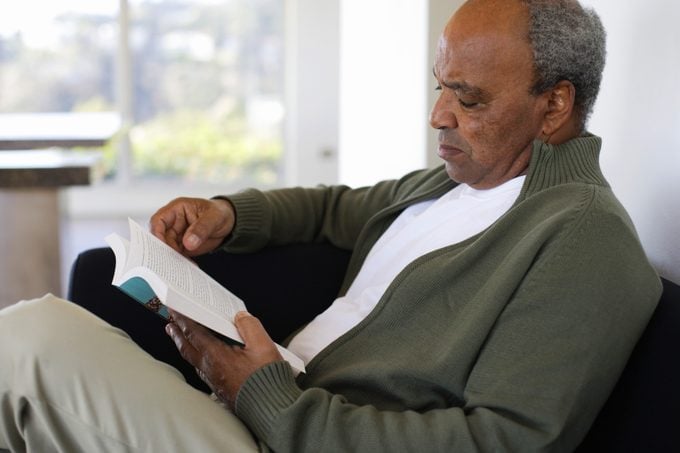24 Therapist Tips for Finding Hope in Dark Times
Updated: Jul. 18, 2022
Coping through issues like Covid-19, geopolitical tension, and racial injustice can feel overwhelming. These therapists offer can-do ways to refuel your hope.
No one could have predicted how distressing and even awful recent months have been. The anxiety so many of us feel about Covid-19, the financial insecurity millions of Americans have been facing, the racial trauma that our country is trying to navigate, and most recently, the Russian invasion of the Ukraine are just a few of the things on our minds from the time we wake up each day.
It’s hard enough to deal with one of those—but when there are so many stressful matters orbiting at once? It’s a lot, says Victoria Egizio, PhD, a psychologist at the University of Wisconsin Hospitals and Clinics in Madison. “The Russian invasion of the Ukraine is now on top of all of the other anxiety-provoking events that have been unfolding in the world during the last couple of years,” Dr. Egizio tells The Healthy.
To help you manage through with healthy ways to cope, therapists shared their best tips with The Healthy for finding hope in difficult times.

Talk with your children
Kids are likely hearing about current events at school and in the media, Egizio says—and, as you probably suspect, they “may not know how to interpret what they’re seeing and hearing.”
Ask what they’re hearing at school about current events to open up these important conversations. Also, Egizio suggests, help your children by reading articles with them and explaining what some of it means, so they’re not jumping to the wrong conclusions and becoming even more scared than they should be.
Know you are not alone
Most of us are feeling scared about what’s happening in the Ukraine, says Robin D. Friedman, a psychotherapist at Lotus Psychotherapy in White Plains, New York. “We are feeling worried for the people in Ukraine and anxious about how this conflict will affect things at home,” she says, adding that this is OK—as long as you don’t let that distress take over, even when the turmoil may touch areas of your life personally. And when it does? “Seek comfort from others, knowing that you are not alone,” she says.
Look for the helpers
As TV’s famed Mr. Rogers once said, “When I was a boy and I would see scary things in the news, my mother would say to me, ‘Look for the helpers. You will always find people who are helping.'”
This advice still holds, says Thea Gallagher, PsyD, a psychologist and clinical assistant professor in the department of psychiatry at NYU Langone Health in New York City. “Turn your anxiety about current events, such as the invasion of Ukraine, into something actionable,” she says. She suggests rolling up your sleeves to find your own way to help can be one way to avoid giving into anxiety. United Help Ukraine, Inc. is a non-profit group better through CharityNavigator.org that receives and distributes donations and food and medical supplies to people in the Ukraine who are affected by Russia’s invasion.
Turn off the TV
Yes, knowledge is power, but inundating yourself with 24-7 coverage will only fuel your anxiety, says NYU Langone’s Gallagher. “Don’t keep CNN on in the background all day,” she advises. Instead, “limit your news watching to 10 minutes a day or visiting two reputable news sites that you enjoy so you know what is going on, but are not overwhelmed.”
Repeat after me: “I am safe.”
When it comes to managing anxiety about events that are not directly affecting us at the moment, remind yourself that you are safe, says Nicole Sachs, LCSW, a psychotherapist in Rehoboth Beach, DE, and author of The Meaning of Truth. “The human-animal is the only animal capable of allowing our ‘thought worlds’ to be more real than the world in front of our eyes,” she says. “When we find ourselves worrying, obsessing, and fixating, the best salve is to pause and consciously remind ourselves that we are safe right here, right now, and in this moment.”
This allows your nervous system to reset and shift from fight or flight to rest and repair, she says.
Take time to breathe
Another possible source of conscious presence is deep breathing. “When you’re stressed or anxious, your breathing can get irregular, and shallow breath affects our autonomic nervous system (ANS), which can make us feel anxious and negative,” says Roseann Capanna-Hodge, an integrative and pediatric mental health expert in Ridgefield, Connecticut. Breathing deeply and intentionally calms down the nervous system, which tempers the stress response in the body that makes us feel anxious and unsettled.
Capanna-Hodge suggests trying the 4-7-8 breathing technique—simply breathe in for four seconds, hold for seven seconds, and then exhale for eight seconds. This rhythmic breathing is great for calming down your body and brain. (Also read 6 Breathing Exercises for Anxiety That Can Help You Feel Calmer.)
Find a cause to rally behind
Taking action against injustice, in whatever way you can, is a great way to be fully present and reignite a sense of hope. LaQuista Erinna, a licensed clinical social worker, and owner of THRIVE Behavioral Health & Consulting, suggests finding a cause to rally behind. This can help you feel more in control of what’s going on around you, and hopeful that change will happen. “In particular, Black people have found a renewed sense of purpose by participating in protests, advocating for change, and demanding equality,” Erinna says. “Many white allies have taken the time to recognize their privilege and have taken action by showing up in meaningful ways for those who are less privileged.”
Lean on your support system
“Collectively, we are all going through unprecedented times of uncertainty and trauma,” says Erinna. Talk to the people who you trust, and let them know how you’re doing. “You may find that you are not alone in how you are feeling and can find some sense of solace by leaning on your support system.”
It can also help to simply reach out to others and ask them how they find hope during these times, says Kathleen Murphy, a licensed marriage and family therapist and executive clinical director at Breathe Life Healing Centers. “You can even ask that question of social media and inspire others to look within and share what works for them. It can feel so good and hopeful knowing that you have prompted a search that brings hope and possibilities to others.”
And hey: know that if you’re feeling the emotional weight of what’s going on in the world around you, it could be a sign you’re an empath. That’s a good thing.

Move your body
The power of exercise as a tried-and-true stress reliever cannot be understated. “Movement is an excellent grounding technique for self-regulation and can help to clear an activated fight-flight-freeze response,” Erinna says. “As a nation, we have all been in a heightened sense of danger for an extended time.”
Moving your body—even if it’s just going for a walk or changing positions throughout the day, so you’re not just sitting still all the time—is a great way to calm down and refocus your mental energy. (Walking, in particular, can be powerful for your mental health—read Is Walking Good Exercise? Fitness Pros Explain Why It’s an Ideal Workout.)
Let go of guilt
“It’s important to not feel guilty if you think you are ‘not doing enough’ to help,” says Siobhan D. Flowers, LPC-S, NCC, CSC, a licensed psychotherapist in private practice in Dallas and adjunct professor at New York University.
For example, in cases of racial injustice, she says, “Not everyone’s role is to be out on the ‘front lines’ protesting. There are many other ways to make a positive impact, including spreading awareness via social media, donating financially to worthy organizations, educating yourself, and having real conversations with family and friends who may have differing opinions.” Instead of feeling guilty about what you can’t do, focus on what you can do and know that it’s valuable, too.
Take advantage of learning opportunities
“From the pandemic, financial insecurity, and increasing racial trauma, there is an overwhelming sense of uncertainty and anxiety about the future,” says Erinna. But because of all of this, many organizations and individuals have offered free or reduced-priced training, certifications, and support in many different areas, Erinna notes.
So, research whatever you’re looking to become more knowledgeable about and find the resources out there that can equip you with more understanding. Use this time to become a better ally to BIPOC (Black, Indigenous and People of Color), fundraise for certified nonprofit organizations, sign up for career coaching, or take advantage of teletherapy options.
Schedule “worry time”
Annie Miller, a psychotherapist in private practice in the Washington, D.C. area, suggests consistently setting a specific time each day to watch the news and let yourself worry. “Acknowledge anything you are worried about and make plans for addressing any issues,” Miller says. “Choose a time that is far enough away from your bedtime so that your brain has time to settle before you go to bed.”
Once “worry time” is over, try to put the stressful things aside and remind yourself that it’s no longer time to focus on them. Miller says scheduling worry time in this way trains your brain with a contained time to process difficult thoughts and emotions. “This may lead to lower stress levels,” Miller says. Sign us up.

Set personal and professional boundaries
To give yourself space to cope with everything from racial trauma to pandemic stress, Flowers suggests setting boundaries around what you will allow yourself to talk about and listen to, read, or watch. “Place limits on the amount of information you are consuming, and be selective about what news sources and social media outlets you engage with,” Flowers says. She adds that picking your battles, disconnecting, and reserving your emotional labor for the tasks you truly want to put effort toward is a form of self-care.
Spend time in nature
Renee Exelbert, a psychologist and founding director of The Metamorphosis Center for Psychological and Physical Change, points out the power of nature when we need a reminder of resilience. Nature “creates a sense of stillness, wholeness, calm, and beauty … [nature is] a testament to all the storms that have come before us. We find the trees still standing, and the canyons richer and deeper, from these storms,” Exelbert says.
In fact, an April 2019 study published in the Frontiers in Psychology suggests it takes just 20 minutes of nature time to noticeably reduce stress hormone levels.
Actively practice positivity
“It is a lot more work to focus on positive things, and it takes practice,” says Miller. “Our brains are wired to protect us from danger and have an inherent negativity bias and are thus more attracted to troubling information.” (Sound familiar? No judgment!)
To pull yourself out of the negativity, actively practice finding something positive to focus on. What’s something you’re looking forward to? What are you grateful for today? Capanna-Hodge suggests visualizing something that’s relaxing, like a walk on the beach, to foster positive feelings. “See yourself there and feel yourself there; bring in those sensory elements. Taking a few minutes every day to practice seeing the positive has an incredibly positive effect on your mood and behavior,” she says.
Make time for self-care
“Placing self-care as a priority is not a ‘selfish’ thing to do, especially during these difficult times,” Flowers says. “Disconnecting and taking a break to recenter yourself is a form of self-preservation that is much needed for your own long-term sustainability in avoiding burnout. Give yourself permission to take a much needed break if you need to.”
Taking time every day to care for our brain and bodies helps us to ground, connect, and stay positive, which ultimately improves our outlook and overall well-being, says Capanna-Hodge. For possible inspiration, check out 10 Easy Self-Care Swaps to Make in 2022.

Turn to books and art
Murphy suggests reading something inspiring, like Victor Frankl’s Man’s Search for Meaning, to learn about how other people have made sense of life when historical times were tough. Exelbert notes that all types of art—poetry, music, and more—can help us process complicated human emotions, as well as inspire and enlighten us.
Do a random act of kindness
“As Gandhi said, ‘Be the change you wish to see in the world,'” Exelbert says. “If you want to see the world in a better, more hopeful way, it starts with you.”
Science has shown that kindness triggers the release of the neurotransmitter serotonin, a chemical in the brain that can improve your mood and make you feel happier. And feeling useful can help foster feelings of gratitude and reinstate a lost sense of hope, says Exelbert.
Find ways to laugh
There’s some truth to the old adage that laughter is the best medicine, says Dayry Hulkow, primary therapist at Arete Recovery, a Delphi Behavioral Health Group facility. “Humor could help to relieve fear, rage, anger, anxiety, stress, and tension; it could alleviate symptoms of depression; reduce feelings of isolation; improve social competence; decrease negativity; and increase a sense of mastery,” Hulkow says.
This doesn’t mean you should forget about what’s going on or make jokes about it. Rather, take some time each day to do something that you know will make you laugh—watch your favorite sitcom or stand-up comedy routine, or schedule some time to talk to your funniest friend. That brief reprieve, even if it’s just for a few minutes, can really help lift your spirits.
Meditate regularly
Meditation is an incredibly effective tool that’s also free. You really can’t go wrong. “Meditation can calm both your mind and body and restore a sense of groundedness and balance,” says Capanna-Hodge.
Try these mini-meditations, or download a meditation app that can guide you, like Headspace or Calm. Also, consider these inspiring but simple ways to establish a meditation space at home.

Prioritize sleep
“Anxiety and stress have a direct effect on sleep,” says Miller. “When you worry, it’s harder for your brain and your body to settle at night when it’s time to sleep. This is particularly true when you are worried about not sleeping or not getting enough sleep.”
If you aren’t sleeping well, that could make you more prone to feelings of stress and sadness. It can be a vicious cycle. Miller suggests a few things to get more sleep. First, if you can’t sleep, don’t lie there trying to do it. “If you can’t sleep, get up and get out of bed. Find something quiet to do, like read or watch TV—though nothing too upsetting or stimulating. When you feel very sleepy again, get back in bed,” Miller suggests. You might have to do this a few times.
Second, establish a sleep schedule. “It is important to keep your wake-up time consistent and understand that you may be tired in the short term, but this will build up sleep drive and eventually allow you to fall asleep faster at night,” says Miller.
Last but not least, give yourself time to wind down and relax your mind before bed.
Reflect on previous obstacles you overcame
“Each time you have overcome an obstacle, it is like putting a deposit into your bank account,” Exelbert says. “When you are feeling low, check the piggy bank to see that there is actually money in there.” Remembering that you’ve been strong and resilient before “shows your brain that you have gone through difficult things before, and have overcome.”
Keep busy
“Idle minds can create worry in times of stress,” says Capanna-Hodge. Focusing on a task or project will help give you a sense of purpose and prevent negativity and worry from hijacking your brain. “Concentrate on a project you have been meaning to do,” Capanna-Hodge suggests. “Maybe it is a work project, or cleaning one drawer every day, or even reading a book that you have been wanting to dive into. Diversion is a great way to stop upsetting thoughts from flooding in.”
Don’t be afraid to ask for help
There’s a lot happening right now that can contribute to mental stress, sadness, and feelings of hopelessness. It’s important to find healthy ways to cope. “A lot of times, it is necessary to ask for help from trusted sources, including supportive family and friends, or even experienced professionals,” Hulkow says. “Empirical research as well as many years of experience, have shown that talking could help to reduce internalized feelings of blame; it could allow us to receive emotional support and guidance; it could help to increase resilience to stress, instill hope, enhance motivation, and satisfy those love and belonging needs we all have.”
If you need help finding someone to talk to, here are some tips for finding a therapist you can trust.
Subscribe to The Healthy newsletter for daily wellness news you need. And, get more wisdom to uplift and empower you right here:






















